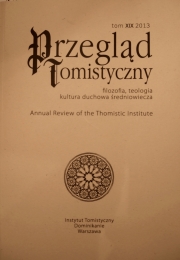Pierwsze i najpowszechniejsze: jedność, prawda, dobro i inne transcendentalia w metafizyce św. Tomasza z Akwinu
The Primary and Most Universal: Unity, Truth, Goodness, and Other Transcendentals in the Metaphysics of Thomas Aquinas
Author(s): Jan KiełbasaSubject(s): Middle Ages, Theology and Religion, Philosophy of Middle Ages
Published by: Instytut Tomistyczny
Summary/Abstract: This article presents an in-depth reflection on the status, importance, and mutual relations between the transcendentals in Thomas Aquinas’s metaphysical system. From elementary explanations of the medieval sense of transcendentality and a general characterization of the transcendentals, the article procedes to the heart of Thomas’s teaching on this subject, recalling how, from his analysis of the concept of ’being’, Aquinas derives a ”canonical” list of transcendentals along with detailed descriptions of their characteristics. The article stresses two disputed elements of the teaching of Aquinas in this regard: his reduction of the many different transcendentals to a mere four (being, unity, truth, and goodness) and the absence of beauty from Thomas’s list, at least in any explicit form. In both cases, the author formulates and tests alternative hypotheses to explain Aquinas’s position and presents his own interpretations both of the meaning of this reduction and of the controversy over the status of beauty as a transcendental. The sections of the article devoted to individual transcendentals focus on important elements of Thomas’s analysis of the transcendental sense of unity, truth, and goodness, with special attention to the different possibilities of interpretation in difficult or questionable areas. These areas include the issue of the meaning of the indivisibility of being in the definition of transcendental unity, the allegation of a circular relationship between unity and multiplicity, the meaning and direction of the adequation in the definition of transcendental truth, the proper understanding of the so-called ”false thing”, the idea of perfection ’in some respects’ versus final and absolute perfection in the characterization of transcendental good, and the sequence and interdependence of the transcendentals in the order of human thinking. The author feels qualified to make critical inquiries of Aquinas on the subject of transcendentals, and thus, in the conclusion, raises questions about specific problems (for instance, the possibility of understanding transcendental unity as a universal axiological property, i.e., a property that perfects being), as well as more fundamental or general questions such as what might be the consequences of a maximal extension of the transcendentals.
Journal: Przegląd Tomistyczny
- Issue Year: 2013
- Issue No: XIX
- Page Range: 251-281
- Page Count: 31
- Language: Polish

